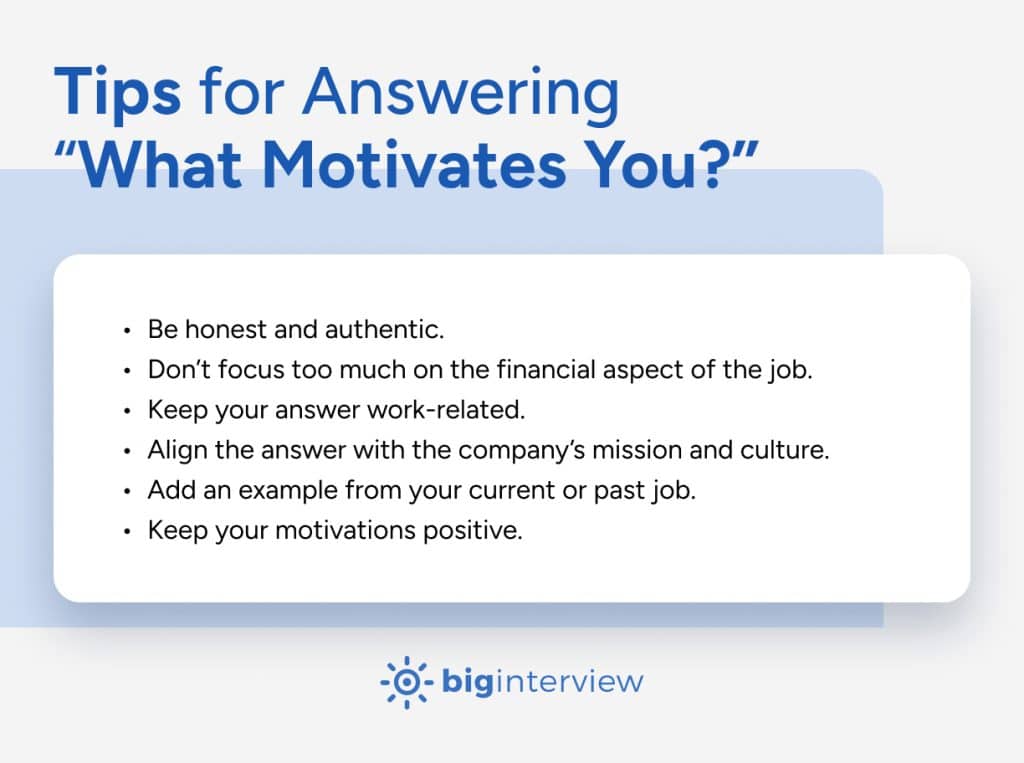
If you were planning to answer the “What motivates you at work?” interview question with “Not dying under capitalism,” “Not going to jail for failing to repay student loans,” or simply “Money”, don’t. You’ll do yourself a disservice.
This is the obvious answer — most of us work to live, not the other way around. With this question, the interviewer wants you to dig deeper to find other, less obvious motivations.
This guide will walk you through what interviewers are looking for, and help you find motivators that are true to you (and won’t make you cringe as you say them).
Want to get an offer after every interview? Our interview preparation tool will guide you through all the questions you can expect, let you record and analyze your answers, and provide instant AI feedback. You’ll know exactly what to improve to turn your next interview into a job.

Don’t waste days compiling overused interview techniques. Get original answers to every single question you could expect.
In summary:
- This question is about the things that make you give your 100% at work.
- The employer wants to know what kind of motivation you need to thrive in the role.
- They don’t expect you to focus on personal goals or compensation only.
- They want to check if your motivations match what they envisioned for the role.
When they ask you about what motivates you at work, the interviewer wants to learn about your work ethics, values, and passions.
This question is a quick scan to see what you’re likely to focus on if you get the job, what will drive you forward, and what they need to do to help you be engaged, productive, and satisfied.
Here are some variations you’re likely to encounter in interviews:
- What motivates you to do a good job?
- What makes a job fun and motivating for you?
- What motivates you to come to work every day?
- What drives you to be successful?
- What makes you get up for work every day?
- What motivates you at work other than the paycheck?
Now take a look at this last example. Notice the “other than the paycheck” part?
This is the key to answering the motivation question — no matter what version you get, always treat it like it ends with “other than the paycheck”.
Let’s get real for a second — money is a valid and important motivator, but every employer knows that. That’s precisely why they want you to focus on something else in your answer.
There’s no need to ignore the elephant, just don’t lead with the financial aspect of the job.
How to Answer “What Motivates You?” in an Interview
In summary:
- Forget about “fake it till you make it” — honesty and authenticity go a long way here.
- To get a better idea about your motivators, think about your natural “drivers” and what makes you energized and happy at work.
- Take the time to study the job description.
- Research your employer and align your response to match their requirements, mission, and culture.
- Prioritize professional motivation, but include personal drivers, too.
- Provide real-life examples of how motivation has driven you to achieve specific goals or overcome obstacles so far.
- To be confident and convincing, practice your answer before the interview.
The best way to answer “What motivates you at work”? is to mix your passions with what your potential employer needs.
Here are some tips to nail your answer.
Be honest
You’ve got to be careful with this one — you want to present yourself in the best possible light but not end up with a chocolate-box kind of response that sounds fake.
Think about the aspects of the job you like. These are the bits that will help you get through a long week. Weave these into your answer.
For a teacher, this can be making a real difference in students’ lives and being part of their journey of discovery and growth.
For someone in customer service, it may be the satisfaction of solving people’s problems and making their day a little better.
Whatever it is, let those genuine, personal touches fuel your response. It’s not just about your tasks, it’s about the impact you’ll make and the fulfillment you’ll get.
💡Pro tip: By grounding your answer in real, personal motivations, rather than faking a response, you’ll show you’re both a great fit for the role and someone who brings passion and commitment. And that’s always a win-win.
Self-reflect and think about your natural “drivers”
To know what motivates you to do a good job, you also need a bit of introspection.
A helpful strategy is to think about the time you felt the happiest and most engaged at work.
Another thing you can do is think back to a moment of satisfaction or a work accomplishment you’re really proud of and ask yourself:
- Why am I proud of this?
- Why did this feel good?
- What steps did this accomplishment require?
- What energized me during the process?
- Is there a pattern in the type of work or projects where I consistently excel?
You may discover that you get energized by working with a team of people on completing a project together. Or that you’re the happiest when sharing knowledge.
Research the company’s mission, vision, and values
Ideally, your top 1-2 motivations should be aligned with the company’s values, culture, and expectations for the role.
As you prepare for the interview, visit the company’s website (the About page is a great place to start), and social media platforms. Check out Glassdoor, Reddit, and any news articles about the company.
There will be a page (or pages) dedicated to mission, vision, and values. Sometimes, you’ll also come across them in the job description too (like in the example below).
Align your responses to the role and company’s mission and work ethics
Let’s say you’re looking to join Too Good to Go as a Sales Specialist. Too Good to Go is a social impact company whose app connects businesses like shops, bakeries, or restaurants that have unsold, surplus food, with consumers who can buy it at a significantly reduced price. The company’s sole mission is to reduce food waste.
To get the job, it’s not enough to show you can do cold-calling and are proficient in Salesforce. You need to show the right motivation, mindset, and a shared vision.
Here’s the job ad:
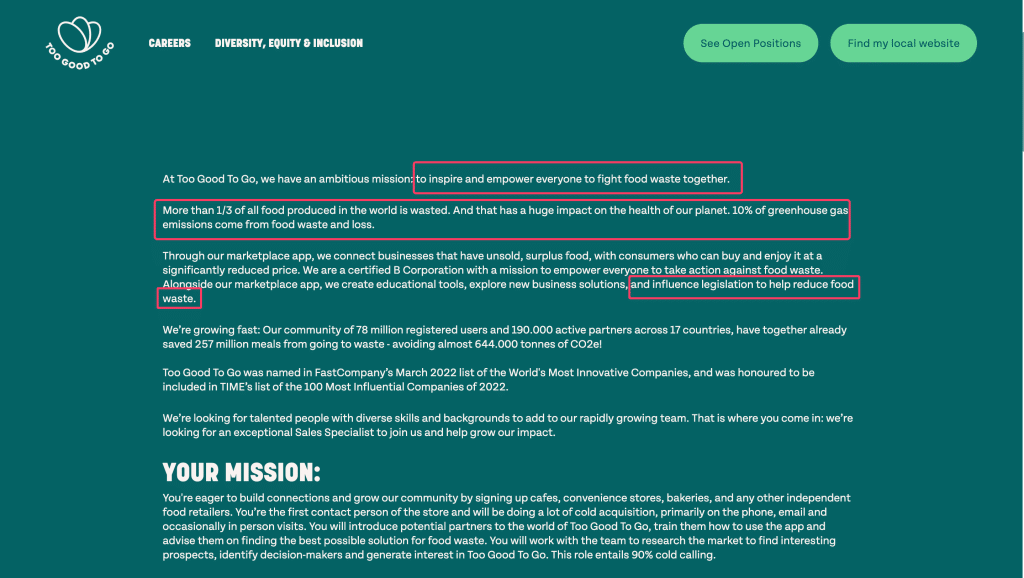
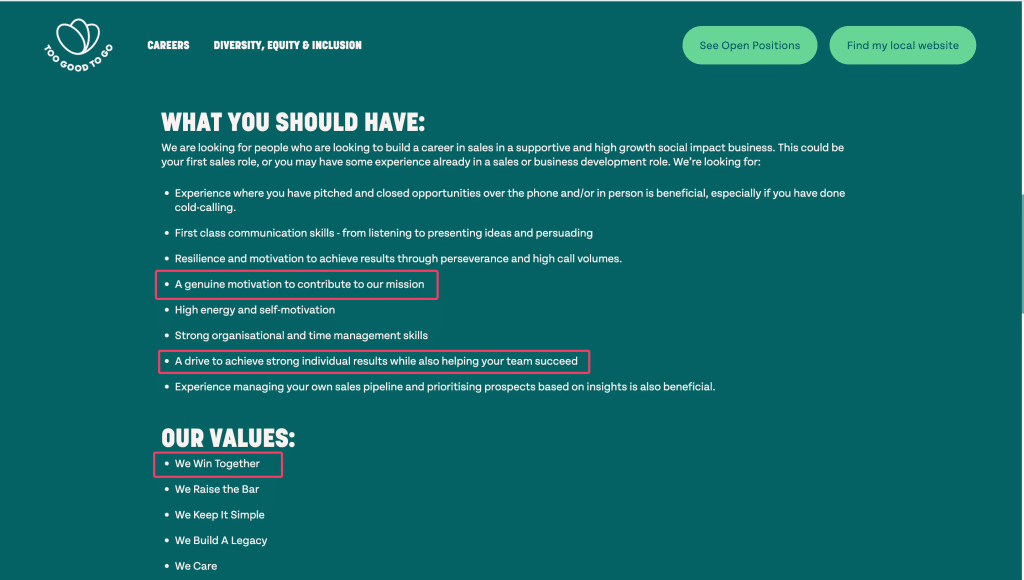
We marked up the parts where the job ad clearly references what your goals and motivations should be. Show you’re up for helping them achieve their mission and you’ll demonstrate true, long-term commitment.
Here’s what you could say:
I’ve always wanted to use my sales skills for a cause that really matters to me and where my impact can be measured. I care deeply about combating food waste and reducing CO2 levels, so the opportunity to contribute to a mission as impactful as reducing food waste is a genuine motivator for me. Being a team player is intrinsic to my work ethic and I’d love the chance to be part of a dynamic team, fueled by a shared purpose and values, working towards a mission that goes beyond individual success to make a positive difference in the world.
💡Pro tip: Authenticity is key. When expressing your motivation for a company’s mission, it’s crucial to be genuine. If you can’t connect with the mission or struggle to identify motivators in the job description, maybe the role just isn’t right for you.
Focus on professional motivations
You know why most candidates get this question wrong?
Because they focus on the wrong things.
- They discuss personal hobbies or family.
- They provide vague, cliché answers.
- They focus on monetary motivation.
When it comes to sharing what gets you out of bed in the morning, you need to make it sound like you’ll still keep showing up (and doing your best) when things get hard at work.
One more thing — show the employer you’re not just after personal fulfillment or gain but are genuinely interested in how you can contribute.
Instead of saying you’re motivated by the idea of climbing the corporate ladder and earning more (a totally legit personal goal, by the way), you might want to talk about a kick you get out of coaching your teammates, seeing them nail their targets, and knowing you played a part in that success.
Give some real-life examples from your past
You’ll be way more convincing if you show how your motivations have pushed you to take action and achieve tangible results in the past.
Try to weave a vivid, specific example where you’ll show how your motivators have manifested and how they helped you hit targets or make an impact.
When speaking about work experiences from the past, it’s best to use the STAR method to tell the stories. This will help you to keep your answers short, structured, and to-the-point.
“What motivates you?” is one of those gold standard questions you can expect at most interviews. So are the ones below, so make sure you have good answers prepared.
See those guides:
- Tell me about yourself.
- Why should we hire you?
- Why do you want to work here?
- Describe your current job responsibilities.
- Where do you see yourself in five years?
- What is your greatest weakness?
- What are your strengths?
Practice
To come up with a good answer, you need to have a solid idea about what you want to say, and then practice so that you deliver the message with clarity and confidence.
You can practice by making a bulleted list of top 3 motivations and then use the mirror or record yourself so that you can review your body language and tone.
You should aim for a clear and structured answer but at the same time, avoid sounding memorized or scripted.
One of the best ways to practice is to use an interview preparation software, where you can go through expert-vetted lists of common interview questions, filter them by industry or seniority, and do interview simulations.
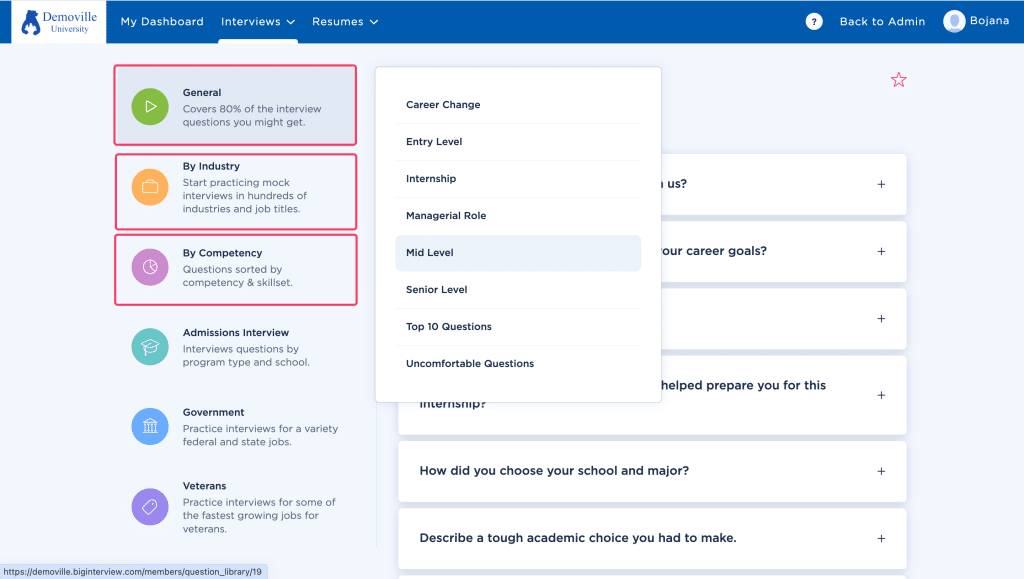
In Big Interview, you can use VideoAI to analyze your answers for key elements like pace of speech, vocabulary, and use of filler words.
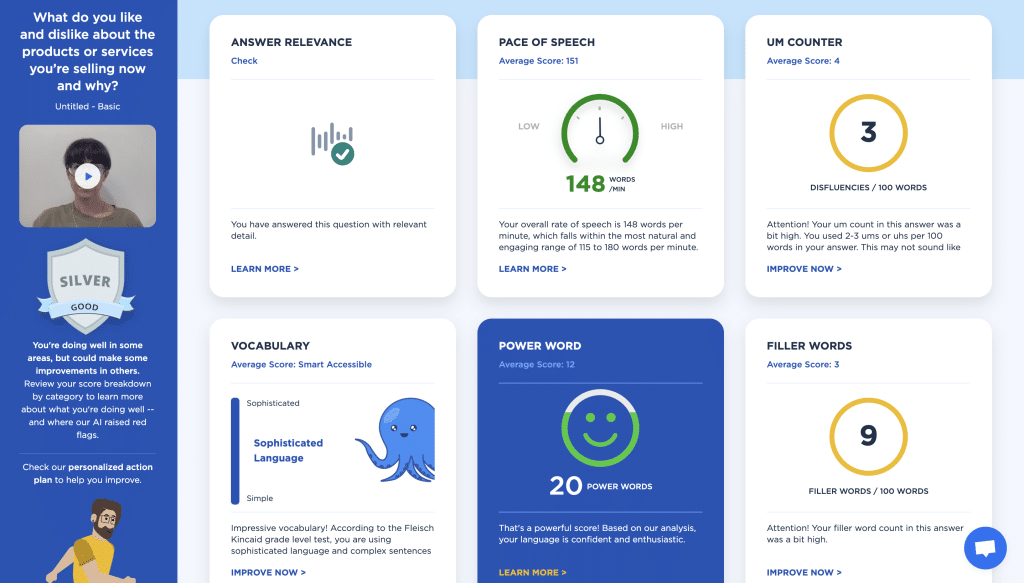
Good Sample Answers to “What Motivates You?”
Let’s look at some great answers to “What motivates you to do a great job at work?” for different industries and seniority levels.
Sample answer for sales roles
Why we like it:
- The candidate shows a deep connection and alignment with Toyota’s brand values.
- They show customer focus and intrinsic motivators that go beyond money, like personal fulfillment and a genuine passion for selling cars.
- They add a human element of guiding and assisting someone while purchasing their first car.
Sample answer for a management position
Why we like it:
- This answer focuses on the enjoyment from choosing the right people for the team and achieving results collectively — something that outstanding managers do well.
- The candidate uses action-packed language, like “bringing diverse talents together,” “collaborate on strategies,” “get excited about results,” and “hit goals.” This shows a proactive and results-oriented mindset.
- Finally, they show their motivation to empower team members and create a collaborative environment.
Sample answer for creative roles
Why we like it:
- This is a strong answer because it mentions the exact tools, showing that the person’s familiar with industry-specific trends and emerging technologies.
- The designer clearly expresses their love of innovation and working with new technologies, and phrases like “truly excites me” or “the thrill for me” show genuine enthusiasm.
Sample answer for a public service job
Why we like it:
- The candidate demonstrates a clear passion for serving the community and helping people.
- They provide specific examples of impactful experiences in previous roles.
- Their problem-solving skills and proactive approach to challenges within the public service sector make them a great choice for the role.
Sample answer for a startup job
Why we like it:
- There’s an alignment with the dynamic and often unpredictable nature of startup culture, establishing the candidate as adaptable and eager for diverse experiences.
- They’re clear about their passion for growth and learning, and place value on personal and professional development in a boots-on-the-ground environment.
- The candidate is smart to mention their direct involvement in projects. This shows a proactive attitude and a results-driven approach (both highly valued in startup settings).
Sample answer for a corporate job
Why we like it:
- The candidate is honest — they thrive in structured environments, meaning they’ll do great in hierarchical and process-oriented traditional corporations.
- The aspiration for vertical growth shows a long-term commitment to the company, which is highly valued in corporate settings.
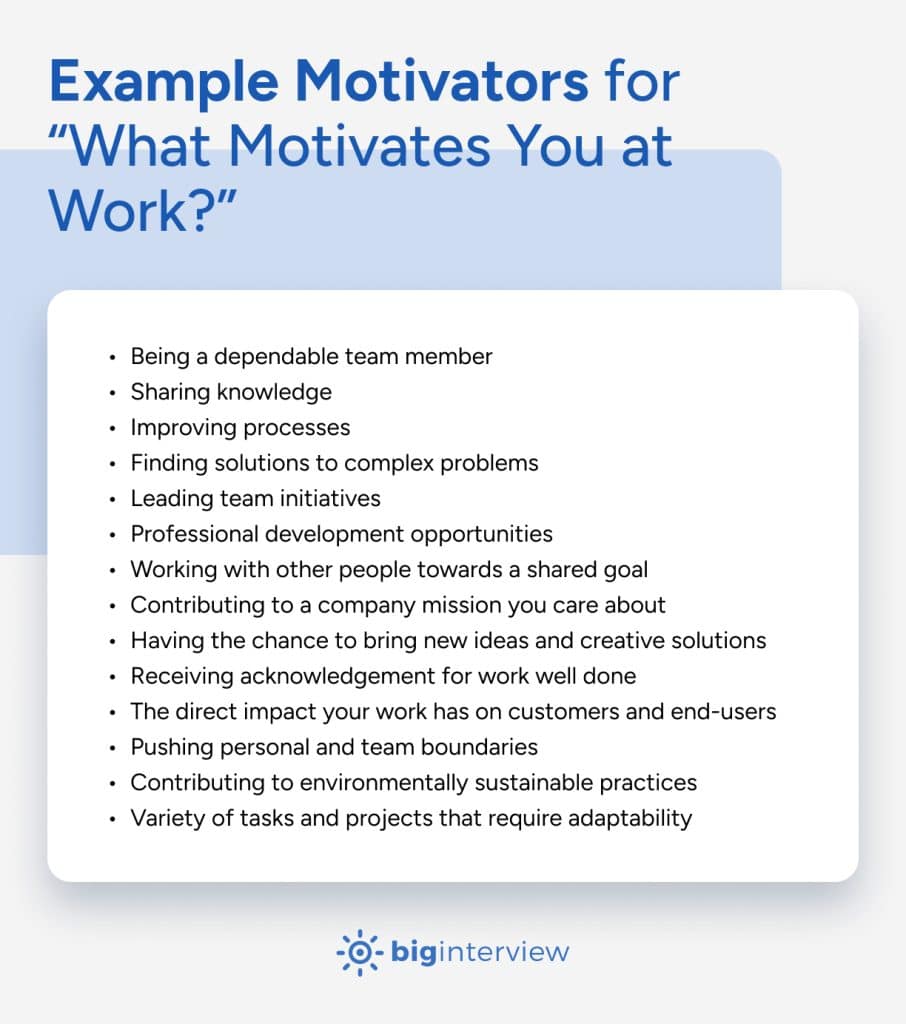
“What Motivates You?” — Popular Opinion vs. Expert Advice
Time to deconstruct the popular interview advice from online spaces like Reddit, YouTube, or Quora.
Two experts, Big Interview’s co-founder and Chief Career Coach with 15+ years of experience, Pamela Skillings, and Michael Tomaszewski, a Certified Professional Resume Writer, analyze the tips given by the community.
User NoHeroes936 on Reddit says:
I’d say something along the lines of, “Success — if I do well, the company does well and my family does well.” The idea is to frame your answer in a manner that delivers a net positive for you and the organization.
Career expert comment:While I agree that delivering a net positive for you and the organization is good, I still think this answer is a bit bland. I like it that it’s clear and straightforward, but I would definitely elaborate on the success part or at least give an example or two of how success has driven me in the past.
— Michael Tomaszewski, CPRW
Up next, Disastrous-Bottle636 on Reddit:
I never BS this question. I always say my goal is to give my kids a better life than I had. To do this I must be a good role model, provide for them financially and supporting them in their endeavors, and leave a legacy that they can be proud of. To a company this means that I care about money, ethics, and work life balance. If they don’t like that last part; then we wouldn’t have been a good fit anyway.
It’s not horrible, but in an interview setting, this question isn’t about personal life goals but professional motivations. Interviewers will appreciate it that you care about setting a great example for your kids, but I advise against being so family-centric in your answer. Try a more balanced approach, where you also emphasize your individual growth, professional aspirations, and the desire to contribute to the company’s success.
— Pamela Skillings, Co-Founder and Chief Career Coach at Big Interview
And finally, Pawan on Quora:
I would say “FEAR”. Fear is an excellent motivator, if you are agile enough to handle the uncertainty gracefully.
- The fear of losing
- The fear of not being accepted
- The fear of failure
- The fear of missing an opportunity
- The fear of pain, disease, death
- All these make you work harder, evolve and emerge stronger than before.
Career expert comment:
Weird at best, creepy and, well, scary at worst. Firstly, using fear as a main motivator carries a negative connotation. Employers generally look for folks motivated by positive factors for a more constructive and fulfilling work environment. Secondly, yes — fear can drive you to action short-term, but it’s never a sustainable source of motivation in the long run. Every employer would want you to focus on more positive motivators like passion, achievement, or a sense of purpose.
— Pamela Skillings, Co-Founder and Chief Career Coach at Big Interview
Summary of the Main Points
Here’s a quick recap:
- “What motivates you” is about the things that make you give your 100% at work.
- You should prioritize professional motivation, but include personal drivers, too.
- “Money” is a surface-level answer that will rarely work in your favor. If you decide to mention it (and it makes sense for some roles and industries), make sure to balance it out with other drivers.
- Be honest, but try to relate your motivators to what’s important to the company you’re applying for. Study the company’s mission, values, and job description, and then align your motivators with that, as well as with the requirements of the role.
- Practice your answer to sound authentic and relaxed.
__________________________________________
Need a hand? There are 3 ways we can help you:
- Struggling to get call-backs? Get personalized interview practice (Rated with 4.9/5 by 1,000,000 users).
- Watch our Chief Coach Pam’s free webinar on unexpected interview questions.
- Learn how to sell yourself in any job interview.
FAQ
What if I’m applying for a job where salary is closely tied to performance and my main motivation is making a lot of money? Can I say that?
This is common in sales roles. Most hiring managers won’t hold it against you if you bring up money as a motivating factor. Just make sure not to center your entire answer around it. You can say the earning potential helps you go the extra mile consistently but try to balance your desire for financial success with other motivators like relationship-building.
I’m out of work, so finding work is my main motivation. How to be diplomatic about it?
The key here is to show motivation without sounding desperate. Don’t say things like “My main motivation is to secure a job since I’ve been unemployed for 10 months.” Instead, show them you’re excited about the role and company, and focus on how this opportunity aligns with your career goals. When addressing the fact that you’re currently out of work, be tactful. Try: “While I am currently exploring new opportunities, I am motivated to find a position where I can make a meaningful impact and contribute with my skills and experience.”
What if they ask, “what inspires you to do a good job?” Is it any different?
Both questions are about your drive and commitment. “What motivates you?” is more about your broader professional motivations and can include personal and career goals (like continuous learning or problem-solving. “What inspires you to do a good job?” is more about the external factors and values that energize you (like team collaboration or a company living its values).
Can I mention personal motivators like wanting to provide for my family?
Yes, as long as you balance it out with other factors. Wanting to provide for your family is a valid motivator, and bringing it up can add a human touch to your answer. If you choose to mention it, be brief: “I would also like to provide a fulfilling and stable life for my family”. To make it clear that family is not the only reason you want the job, highlight that your commitment stems from a strong work ethic. This will show them you take your professional responsibilities seriously.
How to answer “What motivates you?” when I have no experience?
You can always draw from your time in college, previous internships, or volunteering gigs. Highlighting that taking up challenges and overcoming obstacles are your biggest motivators will present you as a go-getter and convince the interviewer you won’t need any hand-holding in your new position.
How to explain that my main motivation is to make a successful career change?
Emphasize your desire for growth and how this career change aligns with your long-term goals. Highlight the skills and experiences you can transfer to the new role, and show you’re ready and enthusiastic for this fresh path. Frame how this move is not just a change but a strategic step towards fulfilling your professional aspirations. Don’t forget to weave in what’s in it for the employer.
I’m overqualified for the position. How should I speak about my motivation?
Make your intentions clear and explain how your interests and goals align with this particular job. This way, the interviewer will understand it’s not just a temporary gig for you until something better comes along. Also, mention that this position is exactly what you need at this point in your life and career. However, be careful not to insist on the perceived perks, such as less stress or shorter hours. Frame it around your desire to make a meaningful contribution.
